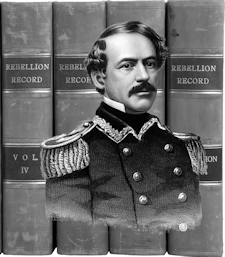Friday, [January] 24, 1862. — A cold morning, ground frozen; promises to be a fine day. Snowed all the afternoon. A busy day. Had a good confidential talk with Colonel Scammon. He gains by a close and intimate acquaintance.
Alfred Beckley, Jr., left with a pledge to return if he failed to get exchanged for young Henderson, Company H, Twenty-third, the captured scout.
Two women wanted me to compel a neighbor to pay for tobacco and hogs he had stolen from them. One had a husband in the Secesh army and the other in the Union army.
An old man who had been saved by our soldiers because he was a Mason, so he thought, wanted pay for rails, sheep, and hogs; another, for hogs; another would give security for his good behavior, having been discharged, on condition he would do so, from Columbus, Ohio.
Sixteen Rebels captured in Raleigh County by Captain Haven sent in. Thirteen of our men found thirteen of them in a house armed to the teeth. They surrendered without firing a shot!! A mail-carrier caught with letters of the 17th. Many from soldiers of the Twenty-second Virginia to their friends in Boone County.
Dr. Joe in a stew and much laughed at by Dr. Jim and myself because he left his trunk, etc., on the river in a big skiff in charge of a blacksmith he had never seen before.










